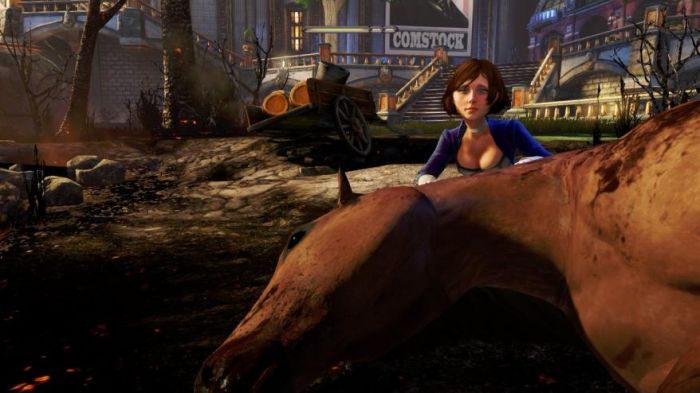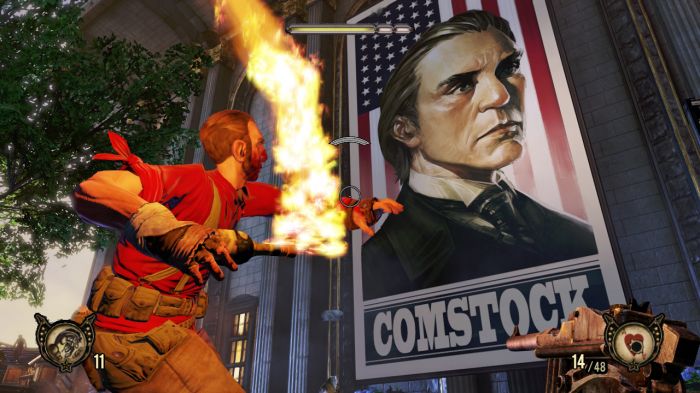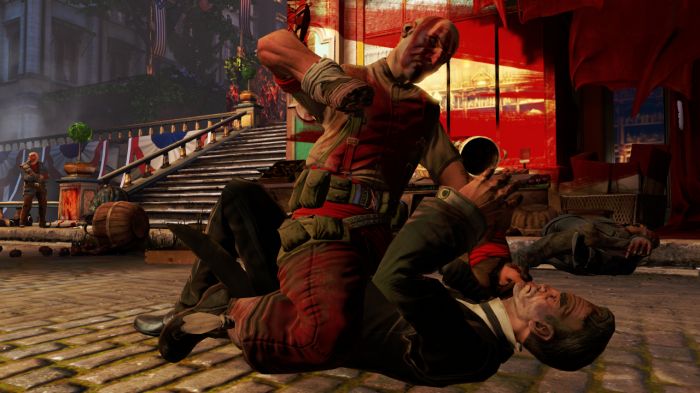
BioShock Infinite Needs to Be Violent
Warning: Contains massive plot spoilers for BioShock Infinite.
BioShock Infinite has garnered all manner of praise and criticism, since its release. It's certainly gotten people talking; with gamers all over the Internet discussing and analysing the game, and that can only be a positive thing. One complaint, however, has been paramount: BioShock Infinite is too violent! "We love the pretty scenery and the lovely relationship between Booker and Elizabeth," the naysayers cry "but it would so much nicer if we didn't have to do all that ghastly shooting!" Well, no. The violent content is absolutely central to BioShock Infinite, in terms of both story and gameplay.

People seem to have missed that the plot itself is about violence, generally. It's a violent story, with violent characters committing violent acts at every turn. Booker DeWitt is a violent man with a troubled past; the phrase "wipe away the debt" refers not to gambling debts but to a spiritual debt, he gives up his child to clear his conscience for his violent acts at Wounded Knee. This is of course forgotten upon entering Columbia at the start of the game, as Booker creates his new memories, and is only discovered later by the player.
The accumulation of violent acts throughout the game makes the revelation of Booker's past all the more believable. In fact it's vital; we can only believe that Booker's committed such heinous acts because we've seen what he's capable of first-hand. Had Booker spent the majority of the game not slaughtering people, attempting to tell us that he's actually a cold-blooded killer would have felt hollow, at best. Admittedly, this makes far more sense after a second playthrough, like many of BioShock Infinite's more intricate points.
Violence is absolutely central to Elizabeth's character as well, albeit in a slightly different way. Elizabeth, both before, during and after the events of the game, is a symbol of the effects of violence. From birth, she is sold by her father, locked in a tower, isolated from society and hooked up to a giant machine that drains her mysterious powers. Elizabeth is subjected to both physical and psychological violence; the scale thereof becomes ever more apparent as the game progress. It really helps to inform the player of the past of Columbia and its dark secrets to hear of Elizabeth's suffering; her jubilant reaction to being set free, rejoicing in seeing something as simple as a beach, should tell you everything about how she was treated.

As the game progresses, Elizabeth becomes more and more accustomed to physical violence, seeing Booker perform ever more violent acts, and her reactions to these acts develop both her relationship with Booker and her own character; she originally chastises him for his acts but, over time, she becomes desensitised and able to kill others herself, a commentary on the effects of exposure to violence that would be lost were it not for the prominence of violence in the story generally.
To anyone who would argue that the violence in BioShock Infinite is a blemish on an otherwise happy story, I would suggest that you haven't really paid attention. It is not a happy story, by any means. Of course it appears to be, at first, with lovely music and beautiful scenery but these features act solely as a contrast to the terrible events to come. The first hour or so spent exploring Columbia is akin to the Tanker level in Metal Gear Solid 2, acting as nothing more than a red herring, creating false expectations and allowing the writer to surprise the audience when the true nature of the plot is revealed.
You can pretend it's a lovely Zelda-esque rescue mission if you want to, but you're denying reality of the game.. BioShock Infinite is extremely dark, with themes of political struggle and racism and subjugation, and you can't wholeheartedly address these issues without showing some graphic violence. It simply wouldn't ring true to claim that Columbia is a terrible, violent place if Booker was able to simply walk through collecting crisps out of bins, in the same way we wouldn't believe that Booker is an inherently unpleasant man if we didn't see it for ourselves.

This is simply from a narrative perspective, the violence is also very necessary from a gameplay point of view. Simply put, the game would be incredibly boring without the combat; it's enjoyable and well-paced and compliments the calmer exploration and story sections wonderfully. This is to say nothing of the game's commercial intentions; Ken Levine himself admitted that the cover was designed to attract a wider audience, and the kind of audience who would buy a game with a short-haired shotgun-bro on the cover would expect a large amount of violent combat. Not to mention the fact that fans of the previous BioShock games would also expect such content, based on their previous experiences with the franchise.
I'm not trying to say that the handling of the violent content was perfect. Elizabeth's acknowledgement of Booker acts could have been explored in further depth, in smaller and more frequents bursts, and those sections in which she throws money to Booker with a smile regardless of context do ruin some important moments. I'll also admit that, on a first playthrough, the violence does seem out of place and excessive. It only really starts to make sense on a second playthrough, once the overarching context of the story is revealed and analysed, so anyone who played it once and once only may be left with an incomplete and out-of-context view of the more violent deeds committed.

I can understand why many people may be dismayed that this game in particular contains such excessive violence, and why it's being singled out above far gorier games like Gears of War or Grand Theft Auto. It almost seems like this was going to be "that game." The one that they could show to their non-gamer parents and friends and prove to them that videogames are more than simple juvenile murder fantasies, and have the potential to be real art. Discovering, then, that your promised artistic masterpiece also contains the same level of murder as your average military shooter may be a little disheartening. No, it isn't going to magically change your anti-gaming mother's stance on video games, nor did it promise to.
You may wish that BioShock Infinite was less violent, but such an alteration would drastically alter the creator's vision and render many of the themes and messages null and void. The statement that BioShock Infinite is too violent, in many ways, betrays an incomplete and unconsidered viewpoint of many of the game's themes and plot points, and I believe that, in context, the gratuitous violence found in the game is completely justified and vital to the overall experience.










COMMENTS
FoxyStoat - 03:04pm, 18th July 2016
I shall return to this upon completion of the game. ;)